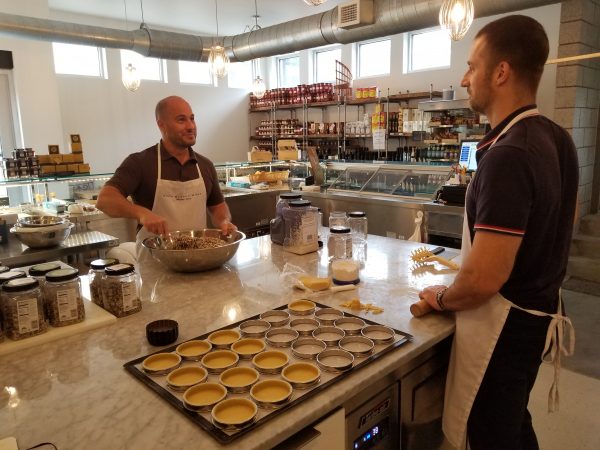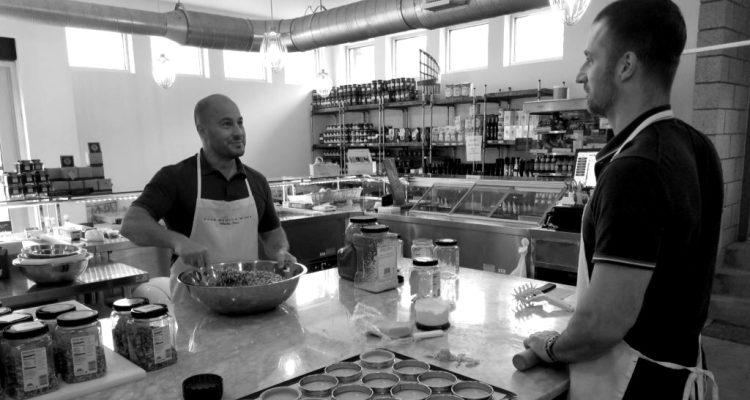Troves of wine line the brick walls. Built during the Victorian Era, the interior’s many rooms ornately furnished with brass statuettes, stained glass windows, and carved wooden walls echo a forgotten time period where decadent extravagance and a strict social moral code stumbled together through the haphazard steps of an awkward dance filled with contradictions. Living in an age of suppression, the Victorians shelved their unacceptable impulses and desires away piecemeal into fragmented mindsets not unlike the surplus of closed off rooms inherent in residences from this period. Expecting to discover Dorian Gray’s grotesque portrait of his emaciated self while roaming these fantastic rooms, an unexpected shuffling of plates mixed with laughter reverberates through those wooden walls. Light seeps into the shadowy room, and a passage to another world appears.
Good Mansion Wines, located on 14th Street, reacquaints Wheeling to an older, traditional culinary lifestyle within a modern setting. Originally intending to introduce the Wheeling area on high quality, international wines within LS Good’s former residence, Dominick Cerrone did not suspect that he would be embarking upon an adventure. He traveled to Paris, and fell in love with its culture. The city’s endless arrays of “boulangeries”, or bakeries, awakened a dormant passion within him. A civil engineer by trade, Dominick did not inherit the art of bread-making at childhood like many craftsman do in the Old World. Here in Paris where a philosophical significance placed on food still thrives, he discovered the art of bread, and pursued learning about it with voracity. This path led him, almost instinctively, to his perfect counterpart, Olivier Thiry. Originally an IT manager in Paris, Olivier shares Dominck’s passion for fine foods. He remembers baking pastries for friends on the side while not imagining that this would lead to both a career and lifestyle. Together, they trained in Parisian bread institutes where they honed their craft and shed misconceptions about bread itself. In 2012, they married, and Olivier moved across the Atlantic to help start a charcuterie as its head patissier in the back of the Good Mansion in 2014. Answering to why they decided to move back to Wheeling, Dominick jests, “I speak English better than I speak French.” Here, they focus on creating low-scale and authentic breads, sandwiches, and pastries within the ancient French traditions.

What is fascinating about this place is the story of a coming together between two people where both culture and country dissipate. Their journey is certainly “unexpected”, but not, however, ridiculous, random, or forced. A passion for learning and creating this art has been there waiting since the beginning. Dominick explains, “Italian is in my blood. I remember making fresh pastas with my dad as a kid.” A native of Toulouse, known as “La Ville Rose” for its Terra-cotta buildings, Olivier grew up where eating was not just an enjoyable affair, but an important family tradition. He says, “Culturally, when I was a kid, my dad would get us all desserts on Sundays.” They would hop from bakery to bakery trying different selections during the entire day, and as a result Olivier became able to distinguish between which the varying qualities of the bakeries. While traveling outwards away from home, they also journeyed inwards where they found themselves and each other.
The difference in architecture between the original Good Mansion and the addition of the charcuterie reflects a contradictory, yet complementary relationship. The charcuterie itself is very airy, full of light, and resembles any cafe one might stumble upon in Paris or sauntering about Rome. Walking through the Victorian corridors uttering landed power into this open, “modern” cafe seems initially strange. These two mindsets grained in their individual constructions signals a contradiction. However, the charcuterie champions tradition, and when you bite into one of their sandwiches, you travel backwards in time before “modernity” did not yet ruin food through industrialization.
Compared to each other, Dominick and Olivier possess distinct personalities. Dominick exudes a calm temperament while Olivier’s focus and intensity is unwavering and methodical. Placing my notebook onto the counter, I watch the two cut out pieces of dough for the shells for chocolate salted caramel and lemon tortes, as pictured in the photograph below. Olivier explains that their are 5 different types of dough for different types of desserts. They can be meant to be baked completely and filled up with a solid filling, or conversely, filled with a runny liquid. Dominick grins and informs me that if Olivier does not like a dessert, he will spit it out directly into the trashcan. Pictured in the photograph, Olivier’s voice sinks into seriousness, and says, “It’s true. I will throw a dessert away. It’s shameful to sell something that is not meant to be how it is supposed to be. ”

For Olivier, appearance must equal its essence. A vast majority of the pastries we consume at bakeries or the dinners we order out at restaurants in the United States are blank canvases in which simple, exterior ingredients mask flavor’s true nature. Placing two different assortments of white chocolate onto the counter, Olivier commences a taste test. The first test group consists of Hershey chocolate while the second contains an undisclosed, probably European, type. The first is that waxy, familiar taste signaled by artificial sweetness. The second is silky, full, and alive. This chocolate fills the palette as its taste gradually fades away. Olivier explains that mass-produced, American chocolate relies solely on sugar in mimicking sweetness. Conversely, the second selection exudes its flavor through combining natural ingredients, like cocoa beans, together instead of creating an imitation of it. The distinction between these two chocolates lies between emphasizing quantity with low prices and crafting art that expresses the true from of its constitution. “It’s more important to have attention to detail where something goes out right than on time,” Olivier begins before concluding, “It’s a French thing.”
And it absolutely is inherent in the French spirit. Dominick explains that France has such a strong bread culture because its landscape resembles the grassy, rolling fields of Ohio where wheat grows in excess. Over a thousand year history, France has developed a science concerned with producing the highest quality breads in the world. They gave different shapes and types of bread, and specific types of flour that are scientifically categorized in a numerical system. French legislation protects bread practices and prices. Historically, the free market has not benefited this trade. In fact, in 1792, the French city of Rouen ruptured into complete chaos when its mayor lifted protective “tariffs” on bread in hope of inspiring an industrious attitude within their bakers after the reading Adam Smith’s Wealth of Nations. Farmers, who were more concerned with finishing that year’s oddly short crop season in the middle of the incessant ten-year period of the French Revolution, could not keep up with demand for grain, and bread prices rose astronomically. Starvation hit, rioting peasants stormed the city municipal buildings, and the mayor ordered cannons be fired on the civilians hitting five and killing one. For the French, straying away from the proper methods of producing its nation’s treasure, excepting wine of course, may carry some severe consequences.
Good Mansion Wines finds itself alone in its own market. Dominick reveals, “It is rare to have freshly made pastries and bread that aren’t frozen.” French bread is meant to be consumed in a day. Currently, American society is averse to bread, or as Dominick would describe as “carbophobic”, while suffering crushing rates of obesity related deaths annually. Much of the bread’s nutrients here are bleached, and in turn, they are pumped full of preservatives to extend shelf lives. According to both Dominick and Olivier, their breads are made with 18 month old mother’s yeast, which cuts down on bad acids and has probiotic benefits for digestion. Olivier remembers riding the metro every morning and evening in Paris with a fresh baguette under his arm. He laments, “In the morning, I would dip a fresh croissant in a coffee or hot chocolate, but stopped doing it here because apparently it’s weird.” Along with baking their breads entirely from scratch, they import all their meats, baking ingredients, olive oils, vinegars, and tomatoes directly from France and Italy. In fact, they travel back to Europe frequently to forge relationships with small, but renowned, family farms to import their products. Describing the rustic landscapes, Dominick recounts, “These are true, passionate artisans. Here we are talking for two hours about tomatoes with them.”
The shop has a total staff of 14 people. For Dominick and Olivier, it’s about inserting homegrown people into a nurturing community where experimentation and exploration are encouraged. Dominick explains, “We take raw talent and mold them into the journey we went on. Anyone who loves it, will learn it.” The geography of the kitchen is very important; it consists of a single massive counter in the center where all of the orders are prepared together, and which is where my notebook currently rests and my hand cramps. Here, the bakers and patissiers work and experiment together under a collective guidance and encouragement. Furthering their journey, Dominick and Olivier take their staff to study abroad in France at the proper institutions like they once did.
Imparting a journey transcending locality and experience lies at the heart of Good Mansion Wines. Through vigor, passion, and community, they strive everyday in perfecting their art.


